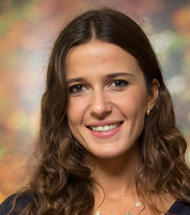An ICS PhD student will study the use of narratives as a method for social integration among Maori adolescents in New Zealand
Sofia Brotóns will undertake a research stay thanks to a grant from the Caja Navarra Foundation

FOTO: Manuel Castells
Sofía Brotóns, a PhD student within the Public Discourse project of the Institute for Culture and Society (ICS) at the University of Navarra, will conduct a research stay at the University of Otago (New Zealand) thanks to a mobility grant for doctoral research studies from the Caja Navarra Foundation. From September to December 2019, she will study text analysis methods that reveal how narratives can shape identity and, thus, favor inclusion.
In New Zealand, she will work with researcher Elaine Reese, from the Department of Psychology at the University of Otago, whose research focuses on how the use of language shapes one’s vision of the world. Together with Reese, she will have the opportunity to collaborate on pioneering research involving Maori teenagers called, "Growing up in New Zealand".
According to Brotóns, young Maori are a socially excluded minority and one of their particularities is their language, which is very different from Western languages, and this, in a certain sense, is very positive. "Both their language, their particular environment and their culture make Maori society an invaluable case study when it comes to understanding how certain factors shape human identity," she explains. Concepts such as the passage from adolescence to adulthood, or even the understanding of death, in Maori culture are examples of how language shapes the way we see reality.
From New Zealand to Spain with positive languageBrotons wants to apply Elaine Rees’s analysis methodologies to her own data: 300 narratives, 300 interviews and 120 self-concept tests collected in two centers for minors in Navarra. Ultimately, the young researcher wants to establish a method that promotes social inclusion for young people in juvenile centers throughout Spain.
"Adolescents at risk of exclusion have experienced really traumatic experiences and often cannot even describe them," she explains. Through writing, the young researcher seeks to improve their self-awareness and future possibilities: "If we are able to positively put into words our experiences, we will overcome them more easily. And, in this sense, the Maoris have a lot to teach us."
In addition, she notes that writing about feelings and problems helps control them because one gets certain distance from them. "These teenagers are so deep into their lives that they identify with their problems, thinking, “I am the problem,” the researcher laments. After working for half a year in juvenile centers, she draws very positive conclusions: "Writing about life and feelings increases self-awareness, self-control and helps young people see where they can go, giving thema sense of optimism."
